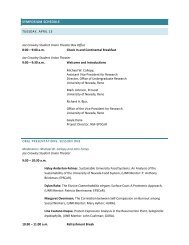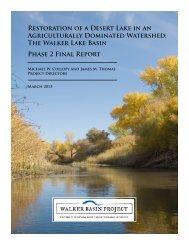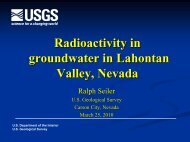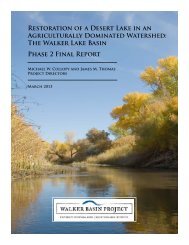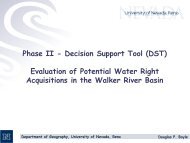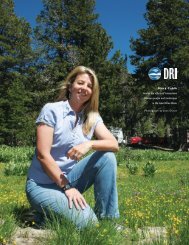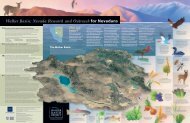Student Research Programs - Office of Undergraduate and ...
Student Research Programs - Office of Undergraduate and ...
Student Research Programs - Office of Undergraduate and ...
You also want an ePaper? Increase the reach of your titles
YUMPU automatically turns print PDFs into web optimized ePapers that Google loves.
organisms was observed using direct microscopy to see what functional groups were present during a four week<br />
period. We hypothesize that soils treated with compost extract <strong>and</strong> herbicide will have respiration rates <strong>and</strong><br />
diversity that are higher than the soils treated with just herbicide. The experiments have not been finalized at the<br />
time this abstract was written, but results to date show an increased level <strong>of</strong> respiration in the samples in which<br />
compost extract or herbicide or both were added. Little difference has been observed in microbial diversity<br />
among the different treatments.<br />
HOW DOES CONSERVATION INFORMATION CHANGE RESIDENTIAL WATER USE<br />
Erika White<br />
Program: NSF REU<br />
Mentors: Kim Rollins, Shawn Stoddard<br />
Department: Resource Economics<br />
Western State College <strong>of</strong> Colorado<br />
The Truckee Meadow Water Authority (TMWA) is a not-for-pr<strong>of</strong>it, communityowned<br />
utility that services Reno <strong>and</strong> Sparks, Nevada. Various state laws, local<br />
ordinances, <strong>and</strong> operating agreements m<strong>and</strong>ate that TMWA operate a water<br />
conservation program to help protect the natural resources within this region.<br />
While the conservation program, the Water Watchers, has been in existence since<br />
TMWA was formed in 2001, there has yet to be a quantitative evaluation <strong>of</strong> the<br />
effect <strong>of</strong> this program on water dem<strong>and</strong>, let alone an evaluation <strong>of</strong> the benefits<br />
versus the costs. Literature reveals that in fact, very few quantitative evaluations have been conducted that<br />
determine the effects that water conservation programs have on individual water use behavior. Our study sought<br />
to answer: how does the Water Watchers program influence the quantity <strong>of</strong> water dem<strong>and</strong>ed by individual<br />
households in the region In answering this question, we will help to establish the value <strong>of</strong> this program to<br />
TMWA <strong>and</strong> its residential customers. The analysis intends to provide information for TMWA to use in deciding<br />
whether changes should be made to the program. Regression methods are used to determine whether<br />
households tend to change their behavior after having contact with the Water Watchers program, <strong>and</strong> to<br />
determine what factors affect the amount <strong>of</strong> water conserved as a function <strong>of</strong> household size, irrigated l<strong>and</strong>scape,<br />
income, weather, type/purpose <strong>of</strong> Water Watcher’s contact <strong>and</strong> other factors. We created a behavioral model,<br />
with data collected by Water Watchers, as well as TMWA’s extensive records <strong>of</strong> water usage, billing records, <strong>and</strong><br />
weather data. We include data from the county assessor’s <strong>of</strong>fice on the size <strong>of</strong> houses, lots, <strong>and</strong> home value to<br />
proxy household size, income <strong>and</strong> the amount <strong>of</strong> irrigated l<strong>and</strong>scape. The panel data include the years from 2003<br />
through 2011, <strong>and</strong> are limited to residential single-family units. Our results are pending.<br />
24



